Iranian MPs Call For Credible Guarantees From US For Renewed Deal
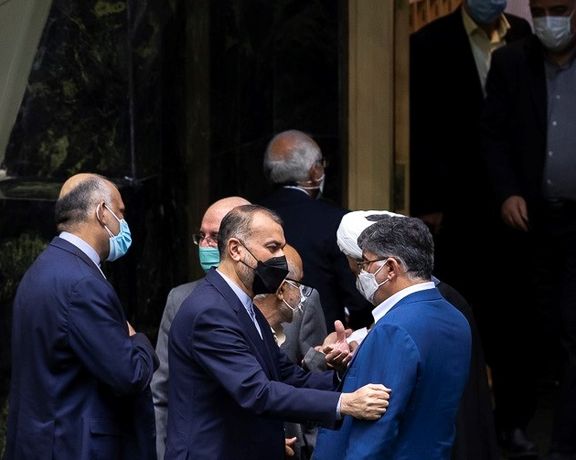
A large majority in Iran's parliament have written to President Ebrahim Raisi calling for credible guarantees from Washington for the renewed nuclear agreement.

A large majority in Iran's parliament have written to President Ebrahim Raisi calling for credible guarantees from Washington for the renewed nuclear agreement.
In a statement read out at the parliament on Sunday, 250 lawmakers insisted that Washington should provide the necessary guarantees that it would not pull out of the deal again, noting that verbal promises, including speeches by President Joe Biden, do not count as guarantees.
The lawmakers said US decision-making bodies, such as Congress, should approve the agreement so nothing can hinder its implementation in the future.
They also described the existence of a snapback mechanism as a practical failure of the talks, urging assurances against its use under various pretexts.
The MPs reiterated that imposing new sanctions on Iranian organizations and individuals should be prohibited as part of the agreement and it should be noted that the lifted sanctions will not be re-imposed.
They also highlighted that Iran should be able to sell its oil and receive the revenues freely, adding that Iran’s frozen assets should also be released.
While the hardliners’ victory in the 2020 parliamentary election strengthened critics of the 2015 nuclear deal in the 290-seat body, Iran entered talks in Vienna one year ago saying that it would agree to restore the 2015 nuclear deal if the United States lifted ‘maximum pressure’ sanctions.
On Saturday, Raisi insisted Iran will not back down from the "nation's rights" in talks to restore the 2015 nuclear deal with world powers.
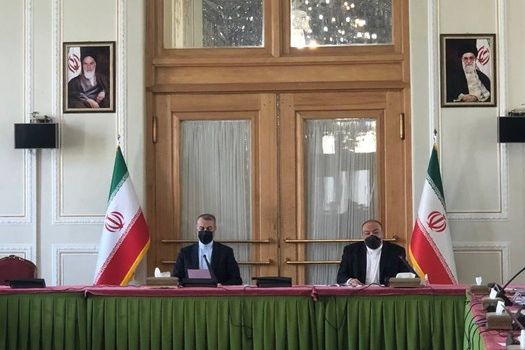
Iran’s foreign minister said Sunday that US President Joe Biden should show some “goodwill”, if his statements about reviving the 2015 nuclear deal are serious.
Hossein Amir-Abdollahian, who was speaking at a meeting of officials dealing with foreign economic relations in Tehran, referred to Washington’s requests for direct talks with Iran and said that the United States should show goodwill. He emphasized that Tehran had asked the USto release some of Iran’s frozen funds prior to a final nuclear agreement but had received no positive reaction.
Amor-Abdollahian first made a direct demand in September 2021, while visiting New York, for the US to greenlight the release of $10 billion from Iran’s frozen funds.
Amir-Abdollahian once again on Sunday reiterated that Iran stands and will continue to stand on its “red lines” in the Vienna nuclear talks.
“The Americans continuously speak of the need for direct talks with Iran. After examining the issue and considering the views the Americans have, we did not find a benefit in direct talks,” he said. Amir-Abdollahian added, that the US “has not done anything positive” to provide confidence.
The chief Iranian diplomat’s remarks did not seem to be suggesting a new formal pre-condition for an agreement in Vienna, but it did appear that he wanted to emphasize the need for some sort of “goodwill” by the Biden Administration.
The negotiations stalled in mid-March after 11 months of talks among the original signatories of the 2015 nuclear agreement known as JCPOA, apparently because of Iran’s demanded from the US to remove its Revolutionary Guard from the list of foreign terrorist organizations.
At one point in his remarks, Amir-Abdollahian said that talks came to a halt after Russia’s invasion of Ukraine and the Western side told Iran that even if all outstanding issues were resolved, Russia would not agree to finalize a deal. In fact, Russia did make a new demandright before the talks ended in Vienna asking the US for waivers from Ukraine sanctions in its dealings with Iran.
Amir-Abdollahian maintained that instead of showing any goodwill, the United States imposed new sanctions on certain Iranian individuals and companies. He suggested that President Biden could release frozen funds with just one “executive order.”
He repeated that Tehran told Washington, “Not to create hurdles” and delay an agreement. “If our red lines are observed,” we can reach a good and lasting agreement, and now “it is the American side that must demonstrate goodwill,” Amir-Abdollahian said.
He added that the diplomatic path is open and claimed that the three European participants in the talks, the United Kingdom, France and Germany are also unhappy about unreasonable American demands.
The foreign minister emphasized that the people of Iran should know the government is striving for an agreement and lifting of sanctions, but he also repeated government’s policy of self-reliance in overcoming the impact of sanctions.
Iran’s economy continues to struggle amid a 40-percent annual inflation rate and a host of other serious issues mainly caused by US sanctions imposed by former president Donald Trump after he withdrew from the JCPOA in 2018. Criticisms and a general mood of despair has intensified in recent weeks as food prices continue to climb, and the government has no immediate solution to offer.
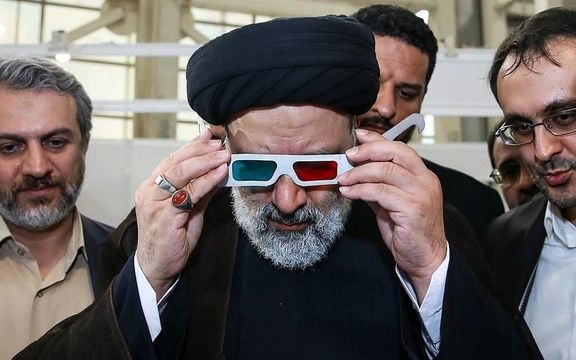
President Ebrahim Raisi on Saturday insisted Iran will not back down from the "nation's rights" in talks to restore the 2015 nuclear deal with world powers.
While stressing that "nuclear weapons have no place in Iran's defense doctrine," Raisi said his government will not back off "even one iota" in the Vienna nuclear talks from what it considers to be Iranian people's right to peaceful nuclear energy.
Raisi who was speaking at a ceremony to mark the National Nuclear Technology Day in Iran said Tehran "hasn't left [the Vienna talks] and will not leave them. "But our strategy is the same strategy announced by the Supreme Leader [Ali Khamenei]," he said, based on which his government and nuclear negotiators are obliged to support "the rights of the nation".
Vienna talks were abruptly paused in mid-March when negotiators returned to their capitals for what they said was consultations. Tehran and Washington have exchanged some messages through the European coordinator of the talks regarding unresolved issues.
Tehran and Washington, negotiating indirectly because of Iran refusal to sit down with the Americans, both blame the other side for the pause in the talks, insisting that the other party should make "political decision". Tehran's demands that its Revolutionary Guards (IRGC) be removed from the US list of Foreign Terrorist Organizations (FTO).
In his speech Saturday, Raisi made no mention of the IRGC and Tehran's demand.
An Iranian diplomat has told Reuters that Tehran has rejected a US proposal to resolve the issue by keeping the IRGC’s extraterritorial arm, the Qods (Quds) Force, under FTO sanctions, while delisting the IRGC as an entity.
There has been much opposition in Washington to the delisting of the IRGC and the Biden Administration has apparently not decided on Iran’s demand. The US State Department said in a statement Friday that President Joe Biden regards the Qods Force a terrorist group.
It is not clear from the statement whether Biden considers the whole of IRGC a terrorist organization or is trying to only keep the Qods Force on the terror list and remove the larger organization to reach a deal with Tehran.
The Biden administration believes that the revival of the 2015 deal can delay Iran’s nuclear breakout timeline, while opponents insist on continuing President Donald Trump's ‘maximum pressure’ sanctions until the regime is crippled or collapses.
Raisi also visited an exhibition by Iran's Atomic Energy Agency (AEOI) on Saturday and unveiled several new products and technologies including the first sample of silicide fuel disks to replace Tehran Research reactor's spent fuel, a detoxification system for pistachios using cold plasma, a cold plasma system and three radiopharmaceuticals for cancer treatment, sustainable zirconia powder production technology, and a laser source for micromachining used in making very small parts.
On the Nuclear Technology Day last year, in parallel with the start of nuclear talks in Vienna, Tehran launched advanced centrifuges for higher enrichment of uranium while reiterating that it was committed to nuclear non-proliferation.
Also addressing the ceremony in Tehran to mark the Nuclear Technology Day was the Head of AEOI Mohammad Eslami who said Tehran expects the International Atomic Energy Agency (IAEA) that monitors non-proliferation issues, not to succumb to pressures exerted by Tehran’s enemies, especially Israel.
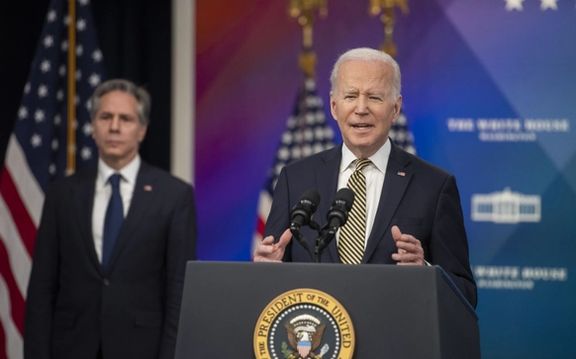
Opponents of a deal with Iran welcomed signals that President Joe Biden is opposed to delisting the Revolutionary Guard as a terror group, but questions linger.
One report suggested that the United States has refrained so far from sending a counterproposal to Iran regarding its demand that the Revolutionary Guard be removed from the US Foreign Terrorist Organization list as a pre-condition to reviving the 2015 nuclear deal, the JCPOA.
Talks in Vienna that have lasted one year were close to completion at the end of February as the Russian invasion of Ukraine began. But then Iran that was insisting all along for the removal of all US sanctions imposed since 2018, demanded the delisting of the IRGC. The US position in the talks is that it will remove major sanctions related to Iran’s nuclear program, but not other sanctions that are related to terrorism or human rights violations.
Once the issue became public, opposition in the United States grew. Most Republicans and many Democrats openly put pressure on the White House not to delist the Guards, that are known to have caused mayhem in the Middle East by supporting a large network of militant groups, all the way to the Mediterranean shores and beyond.
The opposition made it less likely for the Biden team to agree to Iran’s demand, specially as Democrats face an uphill battle in the November elections.
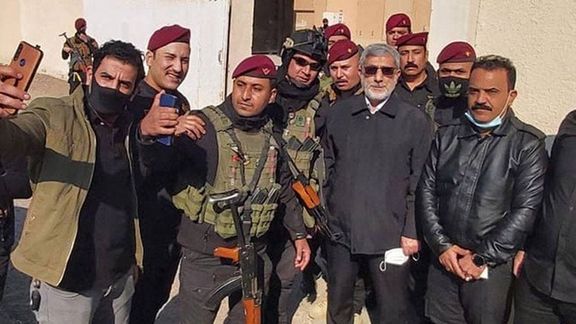
But a nuance in White House statements leads to the possibility that President Biden might be thinking to delist the IRGC but not its extraterritorial Qods (Quds) Force, which is Iran’s direct arm for building up anti-US, anti-Israeli, and anti-Saudi forces in the region.
An opinion piece by David Ignatius in the Washington Post on Friday mentioned that sanctioning the IRGC in 2019 was somewhat of a controversial issue, as some in the government and outside experts believed the multi-faceted entity was not only Iran’s main military force but also a major player in Iran’s economy and the public sector in general.
But opponents of giving a reprieve to the IRGC argue that separating it from the Qods force would be a wholly artificial distinction, just as trying to distinguish between the political and military wings of Hamas or Hezbollah. The US has traditionally rejected such a distinction.
Frequent Iranian threats directed at the United States and Israel are officially pronounced by the Revolutionary Guard, not just by the Qods Force, which speaks occasionally. Practically, the IRGC might even officially disband the Qods and create another outfit overnight that would carry out the same mission in the region.
The issue is Iran’s anti-West ideology kept alive by Supreme Leader Ali Khamenei who reinforces it in every public speech. Every Iranian government entity is supposed to fight against the archenemy, America, and Israel, according to the official dictum of the Islamic Republic.
Even at the height of improved ties in the wake of the JCPOA, Khamenei declared in 2016 that the Islamic Republic had no intention of cooperating on regional disagreements with main enemy the United States and “evil” Britain. He repeated the same message in November 2017, before former president Donald Trump had pulled out of the JCPOA and imposed sanctions.
The Biden administration, however, believes that the revival of the JCPOA is important to delay Iran’s nuclear breakout timeline, while opponents believe in continuing ‘maximum pressure’ sanctions until the regime is crippled or collapses.
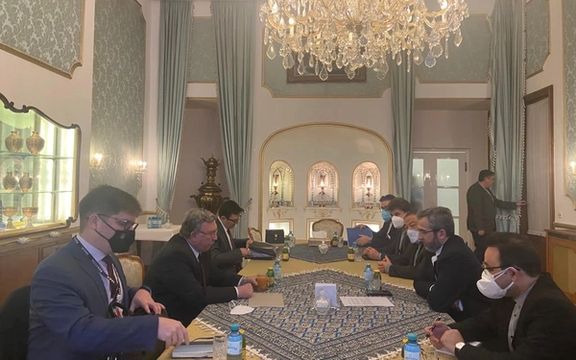
Some Iranian lawmakers have defended the foreign minister against hardliners who claim Iran's negotiators have made too many concessions in the nuclear talks.
Amir-Abdollahian, and the nuclear negotiating team, have been under fire from ultra-hardliners' in the past few days over the contents of a possible agreement to restore the 2015 nuclear deal known as the Joint Comprehensive Plan of Action (JCPOA).
Ultra-hardliner lawmakers close to the Paydari Front and former nuclear negotiator Saeed Jalili have in the past few days strongly criticized Amir-Abdollahian and the negotiation team for what they say is agreeing to make too many concessions to the US and other Western powers. The "red lines" set by Supreme Leader Ali Khamenei and the Parliament, they say, have been crossed.
In a Twitter post on Thursday, Hadi Beiginejad, a hardliner lawmaker claimed that he has examined a "draft of the agreement" and found not only it fails to safeguard Iran's national interests, but it brings on "many more dangers" than the original JCPOA.
Defending the foreign minister in an interview with the official news agency IRNA on Thursday, another lawmaker Ardeshir Motahari responded that some lawmakers were making claims that would only lead to "weakening the negotiating team and the foreign minister".
"Some people are a bowl that is hotter than the soup when it comes to analyzing the process of the talks. They should know being in the middle of the field is very different from making analysis sitting behind a desk," Motahari said about critics of the current negotiators.
In an interview with Gharn-e No in March, Abolfazl Hasanbeigi, former lawmaker and member of the Parliament's National Security and Foreign Policy Committee, named the Paydari ultra-hardliners in the Parliament as the main opponents of the restoration of the JCPOA who are "few" but "shout" loudly to "keep themselves alive".
Motahari refuted the claims of those who have said their criticisms are based on a "draft of an agreement" and said everyone should believe Amir-Abdollahian if he says there is no draft yet. He also noted that "higher officials", presumably Supreme Leader Ali Khamenei, are always receiving reports on the process of the talks and receiving advice.
In late February and early March all sides involved in the Vienna talks that started in April 2021 were expressing optimism over the restoration of the JCPOA but on Wednesday the US Secretary of State Antoni Blinken said he was not "overly optimistic" with the prospect of a deal.
The most important of Iran’s ‘red lines’ is presumably removing the Revolutionary Guards (IRGC) from the US list of Foreign Terrorist Organizations (FTO). The Biden administration has reportedly agreed to delist the IRGC but only if Iran agrees not to seek revenge for the US killing of the IRGC's Qods Force commander, Ghasem Soleimani, and to change its behavior in the region.
"Who can believe that any negotiator -- who has been fighting with foreign sides over an issue as important as the restoration of the JCPOA and the lifting of sanctions, with the blessing of the system (nezam) -- would not abide by the system's red lines and make an agreement," Mohammad-Sadegh Kharrazi, a former reformist diplomat, asked in a commentary in Ettelaat newspaper on Thursday.
In Iranian media and political discourse, system (nezam), usually refers to Supreme Leader Ali Khamenei, who has the ultimate authority to call the shots on important issues.

The US State Department said Friday that President Joe Biden regards Iran’s Revolutionary Guard’s extraterritorial Qods (Quds) Force a terrorist group.
On Thursday, Chairman of the Joint Chiefs of Staff Gen. Mike Milley told a Congressional hearing that he opposes removing the Islamic Revolutionary Guard Corps (IRGC) from the US terror list and believes the Qods Force to be a terrorist organization.
“I’d say that the President shares the chairman’s [Gen. Milley] view that IRGC-Quds Forces are terrorists, and beyond that, we aren’t going to comment on… topics in the nuclear talks,” Deputy State Department Spokesperson Jalina Porter said.
Negotiations that started one year ago in Vienna to revive the 2015 nuclear deal known as JCPOA are in a state of limbo after Iran demanded the removal of IRGC from the US Foreign Terrorist Organization blacklist. The Biden Administration has apparently not made a decision on Iran’s demand.
Most Republicans and many Democratic lawmakers have increasingly voiced opposition to delisting the IRGC, which has created a network of militant proxy groups in the Middle East and threatens US allies.
The nuance in the State Department statement is about whether President Biden considers the whole of IRGC a terrorist organization or is trying to only keep the Qods Force on the terror list and remove the larger organization to reach a deal with Tehran.